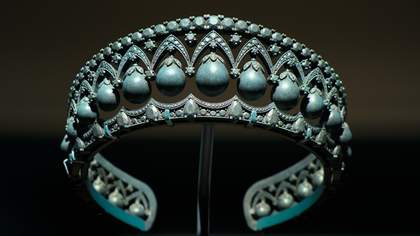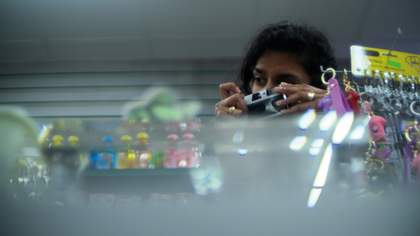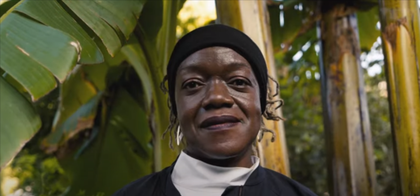Delaine: Someone did say that to me once: "You're a Gypsy, hippy, punk." It’s what it is, I suppose. I'm all of those things wrapped together.
Film Director: Can you tell me who you are?
Delaine: Delaine Le Bas.
It feels nice being in amongst this grass, it makes me feel small. I love being outside. I love working outside as well, it gives you the year, seasons, what it feels like to actually be in the world.
It’s very difficult to explain what it is you do because everyone's got an idea about what art is. I think sometimes it's easier to be in front of a piece of work, with my installations, to be in them to understand.
Delainia 17071965 Unfolding, it's a big installation including works that come from 1991 up to works that we made while we were installing in the space. I used to turn a lot of negative things around in my work, the negative nature of the press, for example, in the headlines against Gypsy, Traveller, and Roma people. So, it's taking that very difficult set of circumstances and making it into something beautiful.
Artists, they’re often the people that are really talking about what's happening when it's actually happening, how that felt or what that looked like. Not the politicians, not the historians that work for the politicians. Often, that doesn't get seen or looked at at the time, but they are the things that we really look back at.
I always have a notebook in my bag and I use them in different ways. Sometimes it's writing, sometimes it's drawing. Sometimes, if I've got my watercolors with me, it might just be a little bit of painting. Sometimes they are more like diaries and journals.And then these were from what I used for Glastonbury, on the wall. So these were three of the characters that ended up being on the wall.
I love being at Glastonbury, and I've been really looking forward to it this year because I've got lots of friends here. It was great seeing Roze again as well—I'm working with Roze. I like to collaborate and work with people.
Roze: I really wanted to make a plan before coming, but Delaine kept reminding me to relax, saying that the plan was going to be created as we worked together in the field.
Delaine: I have a rough idea, but it is a rough idea, and a lot of things develop as we’re going along. This piece of work here is a combination of a lot of different projects. I’ve got to try and keep this still now.
Roze: What are the horses symbolising, Delaine?
Delaine: Well, of course, with Travellers, they love them even though sometimes they don't really use them for much. It's like they have to have one. And then, you've got to think if we had no fuel, we'd need a horse, wouldn’t we? Because what would we do? It's here for the festival, and then who knows what's going to happen to it. Not everything is meant to just be here and last forever.
I like wearing masks. Many people wear masks every single day. They get up in the morning but they’re feeling absolutely awful, or something really bad has happened to them, and they still have to get on with it.
Hi, come in, but I'm warning you, it's a bit cramped in here. Old stuff, new stuff, bits of work—it's just become a bit of a dumping ground. The whole house really is a studio, storage space, and archive.
These mirrors are actually my late husband's work. Damian. I like the fact that you look into them and see yourself, but you also see something else as well. I met Damian when I was at art school. Damian was seen as this outrageous, rebellious character, probably someone I shouldn't have gotten myself entangled with. We argued a lot, especially about the kind of art we were making.
Damian started embroidering this jacket because I'd started embroidering another jacket. It was almost like he was trying to prove he could do it better than I could. I suppose the difficult thing was, I left the house and came back forty-five minutes later, and in that time, he had died. Nothing for me was ever going to be the same after that.
Anything can happen in such a short amount of time. We just have to do the things. We also have to share things. There were things I wanted to do with my work that were really important for me to just do. Expressing grief through performance is really liberating. With performance, it's not something you repeat, so it enables you and gives you permission.
As my fury sparkles in the sun across some decades now, that’s only the time in this place, a place of satanic mills masquerading as something else. Always. Always.
I think my whole life is just one whole thing. I don’t think it’s divided up really. It doesn’t seem to be. I feel that’s how other people feel, especially when they come to the house. What I’m like, what I dress like, and then what I do, it’s all like one big piece of work.
Lincoln: It’s funny. I’m always using red thread.
Delaine: I know, isn’t it? It’s your color, I think.
Lincoln: I think you can get lost in doing needlework. It’s quite nice.
Delaine: I think sewing does that. It has the ability to create a quiet space, it quietens my head a bit as well.
Lincoln: Sometimes we’ll be working, and we don’t speak to each other, but it’s quite good. You can be in the same space, getting on with things together. I find that quite calming in itself.
Delaine: At the moment, the place I'm happiest is when I’m with Lincoln, my new partner. Lincoln’s been so great for me in my life in more than one way. So, I can be happy anywhere, as long as I’m with him. It doesn't matter where it is.
I think being an artist has taught me to express myself fully, which isn’t always comfortable for other people. Life can be very short. It’s not a dress rehearsal. Now. Now. This minute, you know? Just live.



